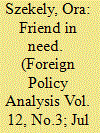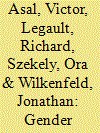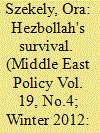|
|
|
Sort Order |
|
|
|
Items / Page
|
|
|
|
|
|
|
| Srl | Item |
| 1 |
ID:
188055


|
|
|
|
|
| Summary/Abstract |
Many nonstate military organizations provide a wide range of social services to civilians. The apparent contradiction between their use of violence and their provision of charity has been the subject of a great deal of research in the conflict studies literature. Two of the most common sets of arguments hold that such services are either a form of bribery aimed at controlling and isolating constituents and potential recruits, or an extension of the organization’s ideological commitments. Our findings, based on a new analysis of the BAAD dataset, demonstrate that neither explanation is correct. Rather, we find that the provision of social services represents a means of confronting and undermining the authority of the state. In this sense, the provision of social services represents an extension of the broader political goals of the nonstate armed groups providing them.
|
|
|
|
|
|
|
|
|
|
|
|
|
|
|
|
| 2 |
ID:
137794


|
|
|
|
|
| Summary/Abstract |
Like many nonstate military actors, Hamas has long provided social services to its constituents, but the mechanism by which charity leads to increased public support is poorly understood. This article argues that providing charity benefits nonstate actors not because it isolates recipients or acts as a bribe but because it allows organizations like Hamas to overcome the legacies of their own military activities and extremist ideologies. Service provision allows them to demonstrate that they are not merely soldiers or ideologues, but capable bureaucrats and managers as well.
|
|
|
|
|
|
|
|
|
|
|
|
|
|
|
|
| 3 |
ID:
191458


|
|
|
|
|
| Summary/Abstract |
The PKK’s gender policy, which includes maintaining a fighting force that is 40% female and the promotion of women’s liberation as a key component of its political platform, makes the PKK an outlier among both Kurdish nationalist groups and leftist armed movements in the Middle East. Based on interviews with members of the PKK’s allied civilian political movement and former PKK combatants, this paper argues that rather than being a function of the PKK’s ethnic or ideological identities, this policy emerged as a result of a confluence of four other factors: the PKK’s leftist ideology, the preferences of its leadership, and the need to recruit selectively all served as permissive factors. Ultimately, however, it was the greater participation of Kurdish women as a result of Turkish state violence in the Kurdish southeast in the 1980s that ultimately changed the PKK from within.
|
|
|
|
|
|
|
|
|
|
|
|
|
|
|
|
| 4 |
ID:
146348


|
|
|
|
|
| Summary/Abstract |
When a regional sponsor of militant movements experiences profound domestic instability, what happens to its clients? This paper explores this question by examining the case of Syria and its clients using a principal–agent approach. It examines three types of principal—single, collective, and multiple—focusing on the varying effects that these relationships have on the agents involved and arguing that each type of principal presents prospective agents with a trade-off between a loss of autonomy and a loss of internal cohesion. By comparing the effects of Syrian sponsorship on nonstate actors who have served as Syrian agents at various points in the evolution of the regime, I demonstrate that each type of principal has distinct advantages and risks for its agents. The paper concludes by outlining five possible outcomes of the current uprising in Syria for the Asad regime's clients, based on the uprising's impact on the regime as a principal.
|
|
|
|
|
|
|
|
|
|
|
|
|
|
|
|
| 5 |
ID:
120768


|
|
|
|
|
| Publication |
2013.
|
| Summary/Abstract |
This article explores those factors that shape a political organization's choice of tactics in political mobilization with a particular focus on the influence of gender ideology on the choice of different type of contentious action. To understand why political organizations engaging in contentious politics choose to employ violent tactics, nonviolent tactics, or a mixture of both, current scholarship has tended to focus on factors such as relationship with the government, external support, and religious or leftist ideology. Far less attention has been given to the role of an organization's ideology relating to gender when predicting its behavior. In addition, much of the analysis of contentious activity has analyzed the use of violence or protest separately and rarely examines the choice of a mixed strategy. We employ a time-series multinomial logistic regression analysis to examine the Middle East Minorities at Risk Organizational Behavior dataset (MAROB), including data over 24 years on 104 ethno-political organizations that have used a range of tactics including protest, violence, and/or a mix of the two, to investigate organizational and state-level variables that lead organizations to choose different strategies. We find that a number of variables can influence a movement's choice to engage in one strategy over another. Gender-inclusive ideology makes an organization more likely to engage in protest and less likely to choose a violent or mixed strategy.
|
|
|
|
|
|
|
|
|
|
|
|
|
|
|
|
| 6 |
ID:
118987


|
|
|
| 7 |
ID:
146064


|
|
|
|
|
| Summary/Abstract |
There is a long-running debate among scholars of international relations as to whether state behavior is more heavily influenced by systemic or domestic pressures. There is far less discussion, however, of the impact of these factors on the behavior of nonstate actors. This stems perhaps from an assumption that nonstate actors, by their very nature, have different priorities than states, and that system-level factors should therefore not matter very much. Their expressed goals are often the overthrow of a particular regime, the control of specific territory or (in practice if not in theory) victory over rival militias. None of these issues suggests that we should expect changes in regional realignment — rather than in the domestic political context — to shape their behavior. If militant organizations are concerned primarily with a local conflict, their alliance behavior, even at the regional and international levels, should be driven by an assessment of which alliances will help them further their goals
|
|
|
|
|
|
|
|
|
|
|
|
|
|
|
|
|
|
|
|
|